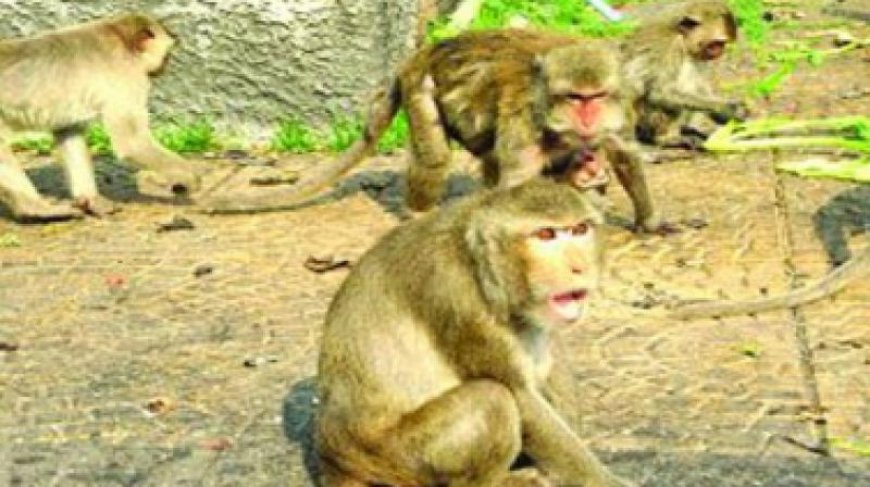Nalgonda: Monkeys force farmers out of vegetable cultivation
The woman was regularly troubled by a pack of monkeys. (Representational Image)The woman was regularly troubled by a pack of monkeys. (Representational Image)Nalgonda: The cultivation area for vegetables in Nalgonda district has decreased by 12.5 per cent. It dropped to 2,900 acres in 2024, down from 3,200 acres in 2023. Once self-sufficient in vegetable production, the district is now grappling with declining cultivation, forcing reliance on imports to meet local demand. Historically, Nalgonda was a surplus producer of vegetables like little gourd, ridge gourd, tomatoes, and leafy greens. Farmers benefitted from horticulture subsidies, and surplus produce was exported after fulfilling local market needs. However, the decreasing trend in vegetable cultivation is attributed primarily to the persistent menace of monkeys, which destroy crops and discourage farmers. Farmers report significant financial and time investments in crop protection against monkeys, often without success. As a result, many are shifting to alternative crops, such as paddy, that are less susceptible to damage. This shift has led to reduced local production, higher vegetable prices, and increased dependence on imports from other states. Efforts to control monkey-related crop damage, such as using slingshots and monkey guns, have proved impractical for large agricultural fields, as constant monitoring is required. The impact of declining vegetable production is stark. According to the National Institute of Nutrition (NIN), the recommended vegetable intake is 300 grams per person daily. Nalgonda requires 600 tonnes of vegetables to meet this standard, but local production has fallen to just 150 tonnes, necessitating imports of 450 tonnes. Farmers like G. Vijay Kumar, who once cultivated vegetables on four acres and invested ₹3 lakh in a pandal system for climbing crops, have abandoned vegetable farming due to monkey threats. "I’ve now shifted back to paddy cultivation," he said. Former horticulture officer K. Kavitha pointed to other challenges, including limited government support for drip irrigation and pandal cultivation systems. "While the monkey menace is significant, a lack of institutional support has also discouraged farmers," she remarked.


Nalgonda: The cultivation area for vegetables in Nalgonda district has decreased by 12.5 per cent. It dropped to 2,900 acres in 2024, down from 3,200 acres in 2023. Once self-sufficient in vegetable production, the district is now grappling with declining cultivation, forcing reliance on imports to meet local demand.
Historically, Nalgonda was a surplus producer of vegetables like little gourd, ridge gourd, tomatoes, and leafy greens. Farmers benefitted from horticulture subsidies, and surplus produce was exported after fulfilling local market needs. However, the decreasing trend in vegetable cultivation is attributed primarily to the persistent menace of monkeys, which destroy crops and discourage farmers.
Farmers report significant financial and time investments in crop protection against monkeys, often without success. As a result, many are shifting to alternative crops, such as paddy, that are less susceptible to damage. This shift has led to reduced local production, higher vegetable prices, and increased dependence on imports from other states.
Efforts to control monkey-related crop damage, such as using slingshots and monkey guns, have proved impractical for large agricultural fields, as constant monitoring is required.
The impact of declining vegetable production is stark. According to the National Institute of Nutrition (NIN), the recommended vegetable intake is 300 grams per person daily. Nalgonda requires 600 tonnes of vegetables to meet this standard, but local production has fallen to just 150 tonnes, necessitating imports of 450 tonnes.
Farmers like G. Vijay Kumar, who once cultivated vegetables on four acres and invested ₹3 lakh in a pandal system for climbing crops, have abandoned vegetable farming due to monkey threats. "I’ve now shifted back to paddy cultivation," he said.
Former horticulture officer K. Kavitha pointed to other challenges, including limited government support for drip irrigation and pandal cultivation systems. "While the monkey menace is significant, a lack of institutional support has also discouraged farmers," she remarked.






































